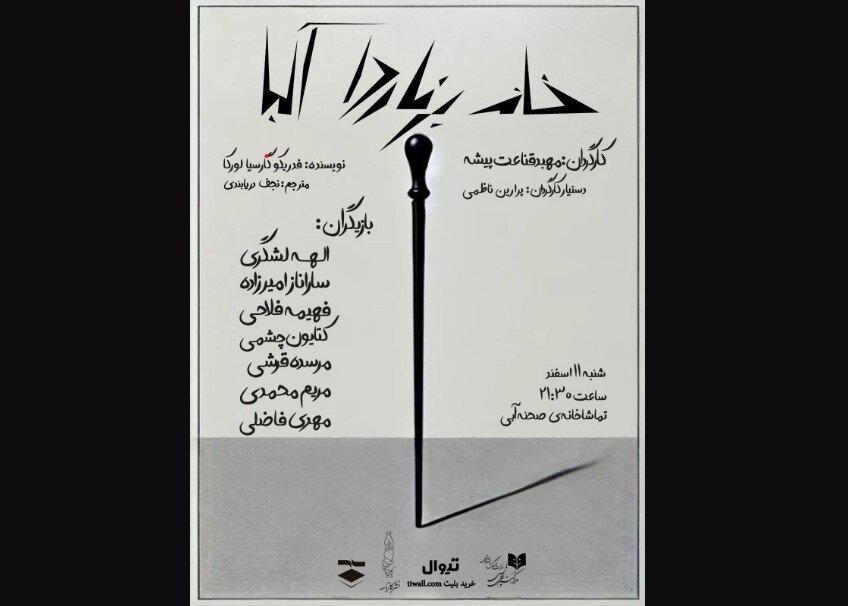Sahne-ye Abi to host reading performance of “The House of Bernarda Alba”

TEHRAN-Sahne-ye Abi Cultural and Artistic Center in Tehran will be playing host to a reading performance of Federico Garcia Lorca’s famous play “The House of Bernarda Alba”.
The performance will take place on Saturday and will be directed by Mahbod Qana’at Pisheh.
The cast will include Elaheh Lashkari, Saranaz Amirzadeh, Fahimeh Fallahi and Katayoun Cheshmi.
The three-act tragedy was published in 1936 as “La Casa de Bernarda Alba: drama de mujeres en los pueblos de Espana” (subtitled “Drama of Women in the Villages of Spain”). It constitutes the third play of Lorca’s dramatic trilogy which also includes “Blood Wedding” and “Yerma”, and it was first produced in Buenos Aires in 1945.
“The House of Bernarda Alba” centers around the oppressive household of Bernarda Alba, a domineering matriarch who enforces strict rules following the death of her second husband. In adherence to family tradition, she imposes an eight-year mourning period, isolating her five daughters—Angustias, Magdalena, Amelia, Martirio, and Adela—from the outside world and any romantic prospects, leading to mounting tension within the house.
Bernarda’s eldest daughter, Angustias, inherits a significant fortune from her late father, thus becoming the object of desire for Pepe el Romano, a young suitor. This inheritance causes jealousy to brew among her sisters, particularly given that they have been left with little by their father. Angustias's wealth gives her a sense of agency, which her sisters resent, especially Adela, the youngest, who yearns for freedom and happiness, symbolized by her decision to defy her mother's mourning dress code by wearing a vibrant green gown.
As the narrative unfolds, the household dynamics grow increasingly fraught. Adela's initial spirit and desire for liberation are dampened when she realizes Angustias's impending marriage to Pepe. Advising Adela, Poncia, the family's maid, suggests that Angustias might not survive childbirth, hinting at a grim possibility for Adela to act on her desires. When the sisters occasionally catch a glimpse of Pepe, the anticipation and tension escalate, with Adela being torn between her burgeoning love for him and her loyalty to her family.
The emotional volatility reaches a breaking point when Bernarda discovers Angustias wearing makeup, a breach of her strict mourning rules. In a fit of rage, she forces the makeup off, illustrating her tyrannical control and the repression of her daughters. The situation intensifies as Maria Josefa, Bernarda's elderly mother, who is usually confined to her room, expresses her own longing for freedom and warns Bernarda about the destructive nature of her oppression.
Adela and Pepe's secret affair, a counterpoint to the family’s rigid moral code, amplifies tensions further. Adela's rebellion manifests in destructive ways, particularly in her conflict with her siblings, especially Martirio, who harbors her own feelings for Pepe. The family atmosphere becomes charged with jealousy, resentment, and desperation as gossip about local women treated harshly for societal transgressions deepens their collective dread.
As the play hurtles toward its tragic conclusion, Bernarda’s refusal to acknowledge her daughters' emotional turmoil culminates in violent confrontation. When a shot is heard outside, it is initially assumed that Pepe has been killed at Bernarda’s behest. In a heartbreaking turn, Adela, believing Pepe to be dead, takes her own life by hanging herself in despair, not knowing that he has survived.
In the aftermath of Adela's tragic death, Bernarda reveals her preoccupation with the family’s reputation, insisting that Adela died a virgin—a manifestation of her rigid moral beliefs. She orders her remaining daughters to grieve in private, refusing to acknowledge the true nature of their struggles or the deep-rooted consequences of her oppressive rule. The play closes with a haunting reminder of the devastating impact of tyranny and societal expectations on personal freedom and emotional connection.
SAB/
Leave a Comment